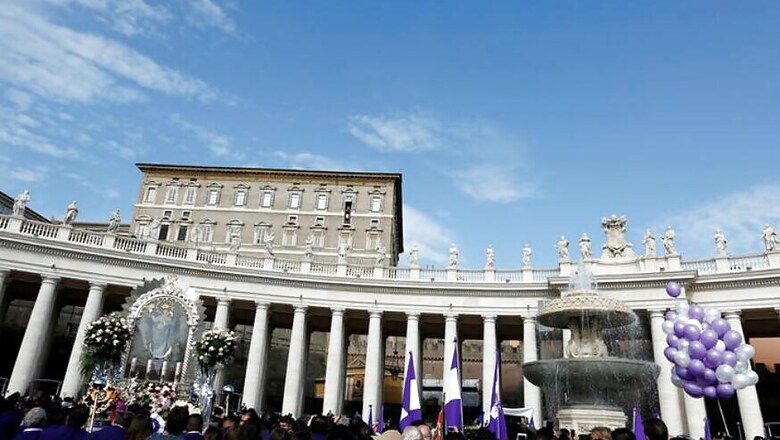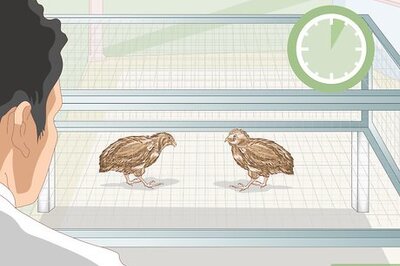
views
A Vatican directive barring Catholics from scattering ashes of the dead, a central practice among Hindus, has raised the hackles of Hindu organisations, who slam it as narrow-mindedness and an unnecessary restriction on the faithful from adopting best practices based in science only because its origins lie in other religions.
The Vatican last week issued guidelines that seek to prevent Catholics from scattering the ashes of the dead into the water, or anywhere else, and decreed that they may only be stored in an urn and kept in a church. The document issued by the Vatican’s doctrinal watchdog, the Congregation for the Doctrine of the Faith (CDF), and also approved by Pope Francis said that many modern cremation practices increasingly reflected non-Christian ideas about “fusion with Mother Nature” and ran counter to Christianity’s central belief in resurrection.
“(The church) cannot, therefore, condone attitudes or permit rites that involve erroneous ideas about death, such as considering death as the definitive annihilation of the person, or the moment of fusion with Mother Nature or the universe, or as a stage in the cycle of regeneration, or as the definitive liberation from the “prison” of the body,” the Vatican document said, adding that while it was not against cremation per se it continues to recommend that the bodies of the deceased be buried in cemeteries or other sacred places.
The Vatican document did not specifically refer to Hinduism or any other faith in the document, but its target appeared to be in no doubt. Hindus regard death as liberation of the soul from the body and as another stage in the cycle of regeneration of the being.
Predictably, the Vatican’s decree has raised the hackles of Hindu organisations, who view it as a reaction from the church to the growing popularity of cremation and scattering of ashes.
The Vishwa Hindu Parishad (VHP) said the Vatican’s decree showed its “narrow-mindedness”
“When Hinduism inspires other religions to adopt certain good practices, why are adverse guidelines issued? This actually shows the narrow minded attitude of the Vatican. Hindu religion has certain good practices, and if any religion is inspired to carry out the same, why put sudden restrictions?” asked VHP spokesperson Vijay Shankar Tiwari.
Others cautioned the Indian government from getting influenced by the Vatican’s rulings and warned of “major retaliation” if such a thing was sought to be enforced in India.
“Why are they (the Vatican) questioning the practice of cremating a body and scattering the ashes? If this view in any manner hampers the practice of the Hindus, then we will strongly oppose it. The government must steer clear of letting such views affect the religious customs in India,” said Pooja Shakun Pandey of the Akhil Bharatiya Hindu Mahasabha (ABHM), adding that the government must not “provide space for such views” in India.
Added Tiwari of VHP: “If any political rulings are given based on such a decision by the Vatican then VHP will leave no stone unturned to retaliate and make its voice heard.”
Hindu groups say the practice of cremating and scattering ashes have a scientific basis and it was this facet that made it popular among adherents of other faiths, and suggest the Vatican’s latest intervention appeared aimed at preventing the spread of competing ideas among the faithful.
“They are issuing these guidelines in the garb of protecting the sanctity of the religion, but it is nothing but a mere joke. Our Vedas have inspired generations in America and China because all our custom and practices are based on scientific proofs. I am confident Indians won’t be inspired by such ludicrous rulings by the Vatican,” said the ABHM chief.
For centuries the Catholic Church forbade cremation altogether, primarily because of the teaching that Christians will be raised from the grave ahead of the Day of Judgment. The ban was finally lifted in 1963 in a landmark Vatican document which accepted that there were often pressing social and sanitary needs for cremation. The Vatican, however, urges Catholics to choose burial wherever possible.
Christian groups in India said the Vatican’s latest directive was not mandatory and bishops could always make exceptions to the ruling.
“This is just another custom among the Christians. I know people in Italy who preferred to be buried along with their pets. So there are other extreme situations as well,” said Father Savarimuthu Shankar, spokesperson for the Archdiocese of Delhi.
On the possibility of the diktat influencing customs of other religion in India, he said: “It’s a strict guideline only for the Catholics, not even for all Christians. Then how can it influence other religions?”




















Comments
0 comment